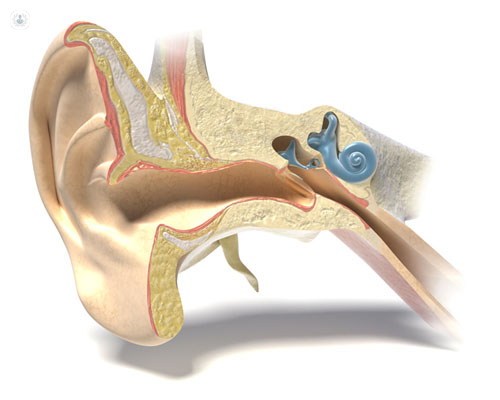Ear neurosurgery
Professor Owen Judd - Otolaryngology / ENT
Created on: 11-13-2012
Updated on: 11-21-2023
Edited by: Karolyn Judge
What is ear neurosurgery?
Ear neurosurgery, or otoneurosurgery, is the branch of neurology dedicated to surgically treating ear conditions that require surgery. This includes diseases affecting the inner ear and a number of nerves that run through or near the ear (facial, auditory, vestibular and lower cranial pairs, hypoglossal, vagal and spinal).

Why is ear neurosurgery performed?
Ear neurosurgery is performed for the early diagnosis of peripheral and central lesions, or skull base conditions, and is also used to treat these problems.
For example, acoustic neuroma diagnosis is based on an index that assesses impaired hearing and vestibular functions.
An otolaryngologist will have knowledge about the auditory and vestibular pathways, organ preservation and rehabilitation of hearing with cochlear implants, and assessment of balance using dynamic posturography, using various otoneurosurgical techniques and approaches.
Otoneurosurgery also encompasses knowledge of the facial nerve and the ability to manage the nerve and rehabilitate associated conditions.
What are the different types of ear neurosurgery?
Types of ear neurosurgery includes:
- Acoustic neuroma surgery;
- Posterior fossa surgery and;
- Skull base surgery, among others.
What does ear neurosurgery involve?
Ear neurosurgery involves using different surgical approaches to correctly assess the person’s condition. These include:
- presigmoid approaches, such as retrolabyrinthine, translabyrinthine, transcochlear and transotic, or;
- middle cranial fossa examination.
In addition, infratemporal approaches and the combination of many of these allow access to more complex local injuries. Traditional neurosurgical approaches, such as the retrosigmoid approach and the extreme lateral approach also come under otorhinolaryngology.
The specialist will usually apply a local anaesthetic before making the necessary incisions and performing the procedures, and will recommend the most appropriate approach in each case.
How do I prepare for ear neurosurgery?
Prior to otoneurosurgery surgery, the surgeon will check to make sure that you have no ear infections. To do this, they will perform several tests, including an ear examination and hearing test.
Head CT scan
In some cases, a CT scan of the head will also be required. It's also important that you ask the doctor what medications you may or may not take. You may need to stop taking some medications (aspirin, anti-inflammatory drugs, or anticoagulants) a week prior to the procedure.
What's involved in post-surgery care?
You will have to follow some guidelines to ensure proper recovery after the ear neurosurgery procedure. The otorhinolaryngologist will advise you to avoid any risks of knocks to the ear, prevent water from entering the ear, and to avoid flying, swimming or diving, as well as excess strain.
Which specialist performs ear neurosurgery?
ENT surgeons and otorhinolaryngologists are specialists who will perform ear neurosurgery. They have microscopic practice and the precision required for working in narrow areas.
